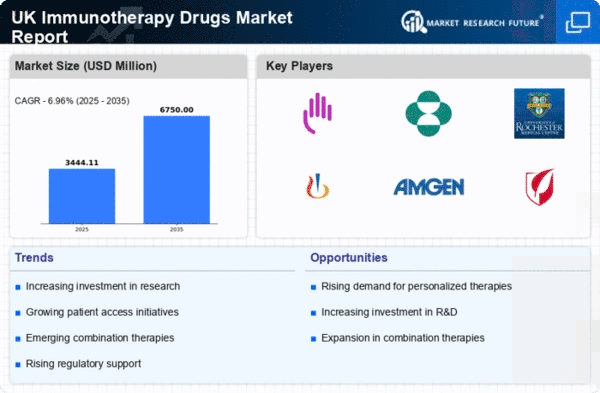Increasing Cancer Incidence
The rising incidence of cancer in the UK is a primary driver for the immunotherapy drugs market. According to recent statistics, cancer cases are projected to increase by approximately 2.5% annually, leading to a growing demand for innovative treatment options. Immunotherapy, which harnesses the body's immune system to combat cancer, is becoming increasingly vital. The National Health Service (NHS) has recognized the need for advanced therapies, allocating substantial funding towards immunotherapy research. This trend indicates a shift in treatment paradigms, as patients and healthcare providers seek more effective solutions. Thus, the immunotherapy drugs market is positioned for significant expansion, driven by the urgent need to address the rising cancer burden in the UK..
Growing Awareness and Patient Advocacy
The increasing awareness of immunotherapy among patients and healthcare professionals is significantly impacting the immunotherapy drugs market. Advocacy groups are actively educating the public about the benefits of immunotherapy, leading to higher patient demand for these treatments. This heightened awareness is reflected in the rising number of clinical trials and treatment options available in the UK. As patients become more informed about their treatment choices, they are more likely to seek out immunotherapy options, thereby driving market growth. The engagement of patient advocacy organizations is likely to continue influencing the landscape of the immunotherapy drugs market.
Government Support and Funding Initiatives
Government initiatives play a crucial role in propelling the immunotherapy drugs market. The UK government has implemented various funding programs aimed at fostering innovation in cancer treatment. For instance, the Cancer Drugs Fund has been instrumental in providing financial support for promising immunotherapy treatments. This initiative not only enhances patient access to cutting-edge therapies but also encourages pharmaceutical companies to invest in research and development. The commitment to improving cancer care through financial backing suggests a robust future for the immunotherapy drugs market, as it aligns with national health priorities and patient needs.
Collaboration Between Academia and Industry
The collaboration between academic institutions and pharmaceutical companies is fostering innovation within the immunotherapy drugs market. In the UK, partnerships are increasingly common, with universities and research institutions working alongside industry leaders to develop new therapies. This synergy not only accelerates the research process but also enhances the translation of scientific discoveries into clinical applications. The establishment of joint research initiatives and funding agreements has the potential to yield groundbreaking immunotherapy treatments. As these collaborations expand, they are expected to significantly contribute to the growth and evolution of the immunotherapy drugs market.
Technological Advancements in Drug Development
Technological innovations are transforming the landscape of the immunotherapy drugs market. The advent of advanced genomic sequencing and bioinformatics has enabled researchers to identify new targets for immunotherapy, enhancing the precision of treatments. In the UK, investments in biotechnology firms have surged, with funding reaching over £1 billion in recent years. These advancements facilitate the development of novel therapies that are more effective and tailored to individual patient profiles. As a result, the immunotherapy drugs market is likely to experience accelerated growth, driven by the continuous evolution of technology that supports drug discovery and development.
















